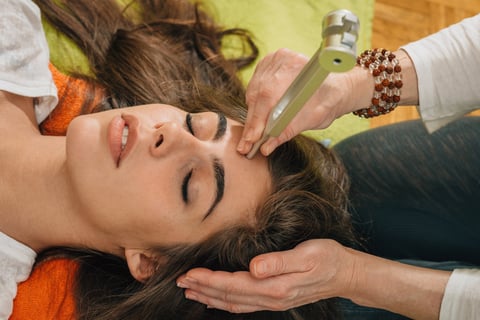"A fundamental principle of sound healing is that physical, emotional and mental symptoms are generated by an underlying energy field. So if we change the energy field, physical, emotional and mental behavioral patterns will also change.” John Beaulieu “Human Tuning"
“The energy you identify as sound serves as the “glue “that holds together matter-patterns... Sound directs matter, and thus anything “cloaked in matter” can be directly influenced by sound..” A. Hayes “Voyagers"
“In the beginning was the Word, and the Word was with God, and the Word was God.” St. John
Sound therapy is a practice that uses vibrations, such as music, singing bowls, tuning forks, drums, and other instruments, to relax the mind and body and promote healing. The idea behind sound therapy is that everything in the universe is in a state of vibration, including our bodies. When our bodies are out of balance, disease and illness can occur. Using specific frequencies and vibrations, sound therapy aims to bring the body back into harmony and promote healing on a physical, emotional, and spiritual level.
Sound therapy has been used for thousands of years in cultures around the world. It is often used as a complementary therapy alongside traditional medical treatments to help reduce stress, anxiety and pain, as well as to improve sleep and overall well-being.
It has been proven that stress is the cause of 85% of our illnesses. The most common symptoms of stress are:
inability to relax,
insomnia,
chronic muscle tension,
chronic fatigue,
irritability,
anxiety,
apathy,
negative thoughts: our inner “opinionist” never stops (mental rumination),
frequent headaches,
becoming our own enemies.
Other cases in which sound therapy can be very useful are:
when we are particularly sensitive to noise or to EMF of electronic devices;
when we have difficulty being in crowded places (such as supermarkets);
when we have difficulty to express emotions;
when we feel imbalances in the energy body (aura).
It is important to note that, although many people find sound therapy to be a relaxing and beneficial practice, it is not a substitute for medical care. It is a good idea to consult a healthcare professional to ensure that it is safe and appropriate for you.
Furthermore, tuning fork sound therapy is always contraindicated:
to people suffering from epilepsy;
to people wearing pacemakers or other cardiovascular devices;
to women in the first 12 weeks of pregnancy.










